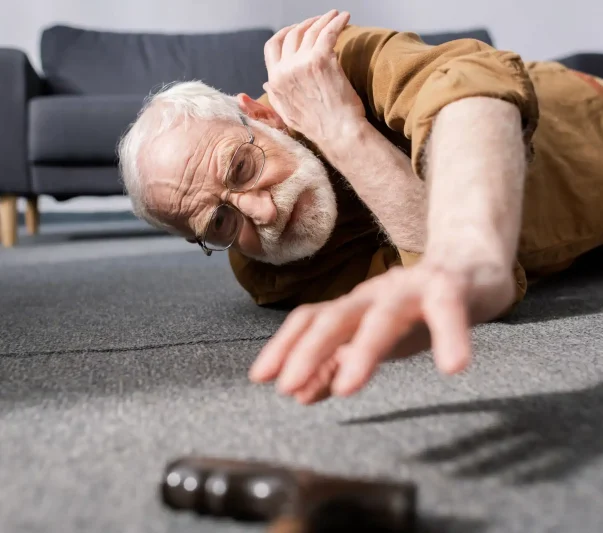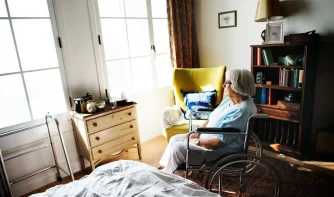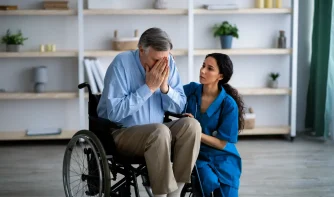Falls are one of the most dangerous accidents that an older adult could suffer. A fall could lead to soft tissue damage, a broken hip, a fractured bone, a traumatic brain injury, or other severe consequences. When an aging family member falls, they may never again have the same level of movement and freedom that they enjoyed before the accident.
No one knows that better than the caregivers at nursing homes. Given the potentially serious repercussions of a fall, we expect nursing home staff to take special care to prevent these accidents from occurring. Unfortunately, managers and caregivers at many nursing homes don’t do enough to protect their residents.
If you or someone in your family has suffered a fall injury at a Denver nursing home, call Olson Personal Injury Lawyers immediately. Get a free case review with our team by calling our Denver office at (970) 633-3673 or visiting our contact page.
How Serious Are Nursing Home Falls in Denver?
Fall injuries among the elderly are a significant issue in the Denver area. A report from the Colorado Department of Public Health says 728 people aged 65 or older died in one year from fall-related injuries statewide. The report also says 29,000 people age 65 or older received treatment for fall-related injuries at Colorado hospitals and emergency departments.
Nursing home falls are a problem across the county, not just in Denver or Colorado. The Centers for Disease Control and Prevention (CDC) report that:
- Around 5 percent of adults 65 and older nationwide live in nursing homes, but nursing home residents make up 20 percent of all deaths among this age group.
- A typical nursing home with 100 beds reports 100 to 200 falls every year, with many more falls possibly going unreported.
- Between 50 and 75 percent of all nursing home residents fall every year.
Why Do Falls Occur More Often in Nursing Homes?
Older adults in nursing homes are more at risk of falls for several reasons. First, many older adults living in nursing homes are there because they have Alzheimer’s or other mental health conditions requiring special care. People with mental health issues are more likely to sustain a fall injury regardless of where they’re living, including in nursing homes.
Nursing homes can be more dangerous for older people regardless of their mental health. If a facility is overcrowded, understaffed, or poorly maintained, it’s much more likely that a resident won’t get the care and attention they need to avoid a fall. Maintenance issues, such as slippery floors, loose carpeting, stray electrical cords, and other hazards, can make it more likely that an older person hurts themself in a fall at a nursing home.
What Are the Most Common Causes of Nursing Home Falls?
Some of the most common causes of falls in nursing homes include:
- Poor maintenance – Given how susceptible older people are to falls, nursing homes need to take special care to minimize possible fall hazards. If nursing homes don’t watch out for these hazards (spilled liquids, loose carpets or rugs, stray cords, broken steps, etc.), it’s very easy for someone to fall and get hurt.
- Muscle weakness and walking issues – If someone has trouble walking, they are especially prone to falls. Common walking problems among people 65 and older include gait problems, muscle stiffness, and poor coordination. Nursing home staff must provide residents with the support they need for mobility.
- Improper transferring – Staff members often need to help residents get in and out of bed, move to a chair or another location. When the staff doesn’t have the proper training and the transfer isn’t done correctly, a resident can easily fall.
- Poor footwear – Suitable footwear that fits well is a crucial way to minimize the chance of fall injuries, but it’s something nursing homes often overlook. Residents should wear well-fitting, non-slip shoes to give themselves the best chance of avoiding a fall injury.
- Medications – Some medications can impact a person’s coordination or balance, making it harder for them to stay on their feet. These side effects tend to be more severe in older people, making it more difficult for them to safely navigate the environment around them.
Nursing home facilities must be held accountable for failing to provide proper care. If your loved one has experienced neglect or abuse, you can seek justice on their behalf. Contact us to discuss your legal options.
Common Injuries from Falls in Nursing Homes
A few of the most common significant injuries the residents sustain in nursing home falls include:
- Broken bones
- Joint damage
- Brain damage, including traumatic brain injuries
- Sprained ankles and wrists
- Back and neck injuries
- Damage to the spinal cord
- Soft tissue damage
How to Prevent Falls Among the Elderly in Nursing Homes
According to the Agency for Healthcare Research and Quality (AHRQ), nursing home staff can help prevent falls by:
- Evaluate all residents for their risk of a fall.
- Get residents to exercise and do physical therapy to strengthen their muscles and coordination.
- Make sure residents have proper footwear.
- Give residents hip pads to minimize their chance of a hip fracture if they fall.
- Provide safety aids to help residents navigate the facility safely, such as handrails, lowered beds, raised toilet seats, etc.
- Check residents’ vision and make sure their prescription for their glasses or contacts is up to date.
- Look at residents’ medication lists to check for side effects such as dizziness, confusion, etc.
Hold Denver Nursing Homes Accountable
If a nursing home resident sustains a fall injury, the facility will likely try to shift the blame to the resident to avoid paying out compensation for their injuries. Here are some ways an experienced Denver nursing home fall lawyer can work to hold facilities accountable for their negligence:
- Reviewing the residents’ medical records and medication lists
- Looking at the facility’s records to see if there’s a prior history of fall injuries
- Using photographs and surveillance footage to establish how the injury occurred
- Getting statements from eyewitnesses
- Getting testimony from medical experts
Our Denver personal injury attorney Sean Olson and his team are here to help you and your family seek the compensation you deserve for a nursing home fall injury. Get your free initial consultation by calling our Denver office or filling out the online form on our contact page.





